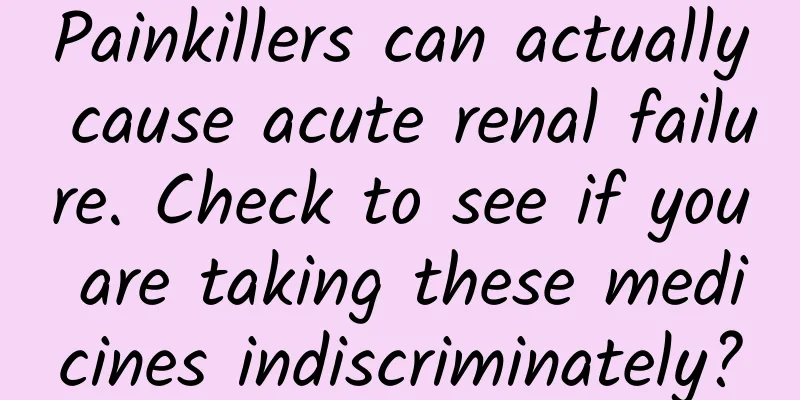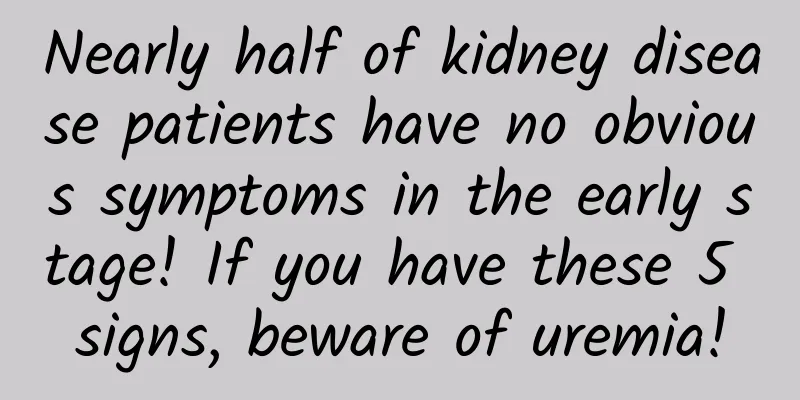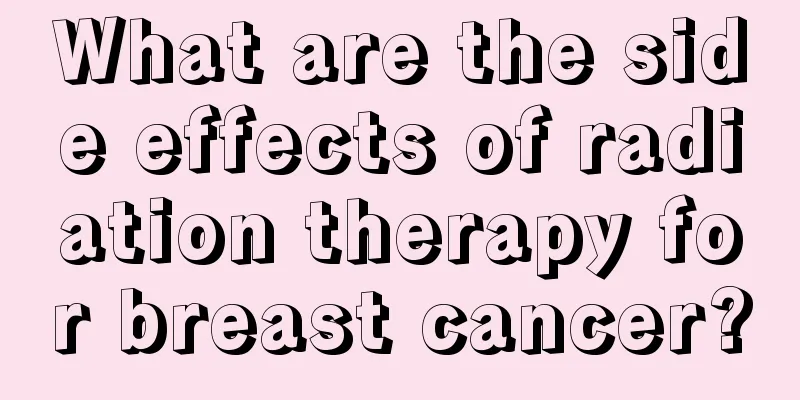Painkillers can actually cause acute renal failure. Check to see if you are taking these medicines indiscriminately?

|
Recently, a hot search caught the editor's attention - a senior high school student took 4 painkillers in 3 hours and was diagnosed with acute renal failure. It is understood that many parents think that taking their children to the hospital for "minor problems" such as leg pain and toothache will delay their studies. Commonly used painkillers have a high safety factor and can be taken safely according to the dosage in the instructions. When the child has pain here and there, he or she can take painkillers to bear it first, and then go to the doctor on the weekend. As a result, there are more and more student cases of "drug-induced acute renal failure". Why do painkillers cause acute renal failure? The full name of commonly used analgesics is non-steroidal anti-inflammatory drugs, mainly aspirin, acetaminophen, indomethacin, naproxen, naproxenone, diclofenac, ibuprofen, nimesulide, rofecoxib, celecoxib, etc. Non-steroidal anti-inflammatory drugs can inhibit cyclooxygenase, thereby inhibiting the synthesis of prostaglandins, reducing the effect of prostaglandins in maintaining renal vasodilation, causing medullary vasoconstriction, reduced renal blood flow, renal interstitial fibrosis, and leading to acute kidney injury. The main clinical manifestations are oliguria or even anuria, hematuria, edema, vomiting, nausea and other symptoms. Studies have shown that common drugs that can cause kidney damage include antibiotics, antiviral drugs, anti-tumor drugs, immunosuppressants, renin-aldosterone-angiotensin system inhibitors, diuretics, anti-osteoporosis drugs, and some traditional Chinese medicines such as Aristolochia mandshurica [1]. The following is an introduction to some common drug-induced kidney toxicity damage: How to deal with acute renal failure caused by drugs? Most patients with acute renal failure caused by drugs have a good prognosis after timely medical treatment and accurate diagnosis and appropriate treatment. If the patient suddenly develops oliguria, anuria, and edema, has a clear history of medication and can rule out other causes of renal damage, combined with renal function tests, the diagnosis can basically be confirmed. After a clear diagnosis, the use of drugs that damage the kidneys should be stopped as soon as possible, and the use of the drug and similar drugs should be avoided as much as possible. Glucocorticoids can be used for treatment in the acute phase. Generally, renal function can be restored 1 to 7 days after discontinuation of the drug that causes acute renal failure. If renal failure continues to progress after discontinuation of the drug, a renal puncture biopsy is required to clarify the pathological type before the next step of treatment. If the situation is more serious, hemodialysis treatment is required. summary As the saying goes, "All medicines are poisonous", improper medication can cause damage to the body, especially the kidneys. Everyone must pay attention to taking medications according to the doctor's orders, and pay special attention to the drugs with nephrotoxicity mentioned above. When teenagers feel unwell, parents should take their children to the doctor in time and do not delay to avoid delaying the condition. If you really don't want to delay your studies, you can choose a night clinic, and don't buy medicine for your children on your own. Finally, I would like to emphasize that you should not avoid taking medicine because of adverse drug reactions. Studies have shown that drug-induced acute renal failure is often caused by excessive frequency or dosage of medication [3]. As long as you take the medication according to the doctor's instructions, drug-induced kidney damage will generally not occur. For patients who take medication for a long time, the doctor will also arrange for them to have regular liver and kidney function checks during the medication process to minimize the occurrence of drug-induced kidney damage. |
<<: Thyroid cancer is besieging more and more young people
>>: Which is better, vitamin C that costs 2 yuan or vitamin C that costs hundreds of yuan?
Recommend
What causes lower abdominal pain after menstruation?
Female compatriots are often deeply affected by g...
What should I do if I vomit during my period?
It is a normal pregnancy reaction for women to vo...
Sleepless nights before your period
Menstruation is a physiological phenomenon in whi...
Countdown to the 2024 College Entrance Examination, myopic candidates who want to apply for these majors are recommended to save this!
If the college entrance examination is a watershe...
Use vinegar to whiten private parts quickly?
Generally, girls' private parts are pink when...
Aging starts from the feet
Since ancient times, there has been a saying in t...
What to eat for malignant breast hyperplasia
Women's bodies are different from men's, ...
Woman sweating and insomnia
In daily life, many women suffer from insomnia an...
Why does ovulation cause back pain?
The female cycle is divided into the safe period,...
Endometrial thickness 5mm
With the liberation of people's ideas and con...
What foods can protect the liver and kidneys for women?
Nowadays, people's main focus in health prese...
Coronavirus's "accomplice"-pathogenic fungi丨Things about microorganisms
Editor's note: Microorganisms are both our fr...
Will the vaginal discharge increase before giving birth?
Before giving birth, many pregnant women experien...
How to take care of your uterus?
No matter what you do, mastering the method is ve...









